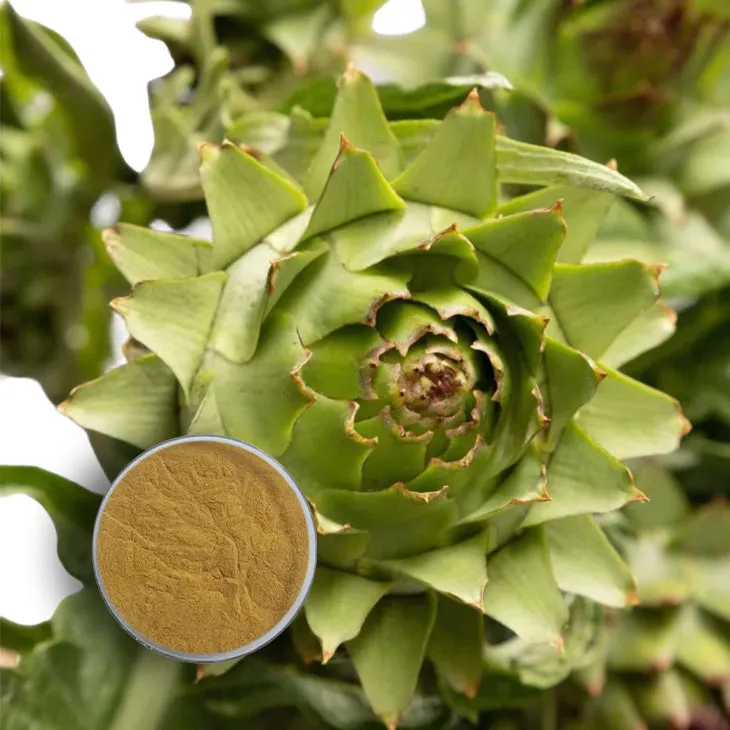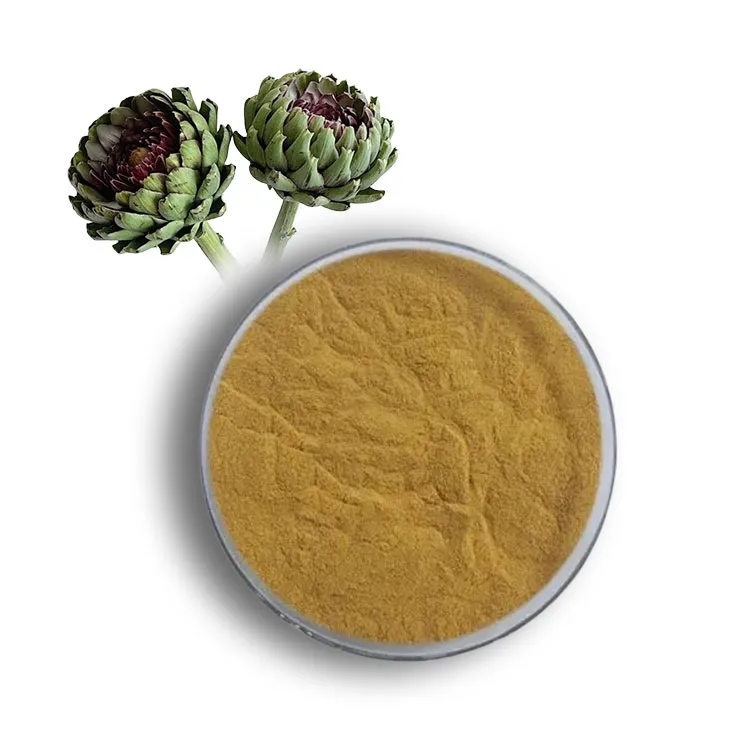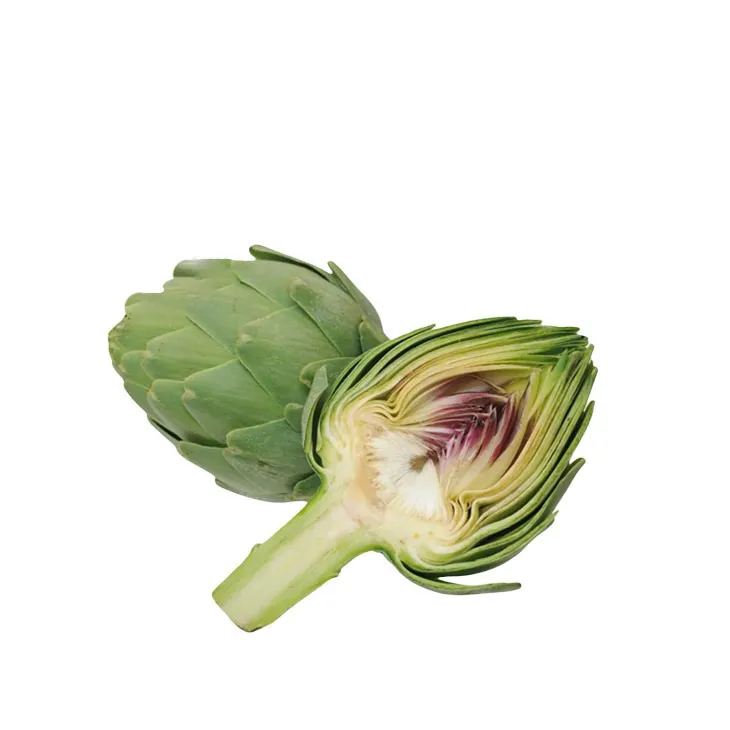- 0086-571-85302990
- sales@greenskybio.com
Artichoke leaf extract: What are its benefits and how to take it?
2024-11-12

I. Introduction
Artichoke (Cynara scolymus) has been used for centuries for its various health - promoting properties. The Artichoke Leaf Extract is a concentrated form that has gained significant attention in recent years due to its potential benefits. This article will explore the advantages of Artichoke Leaf Extract and how it can be taken properly.

II. Benefits of Artichoke Leaf Extract
A. Digestive Health
1. Bile Production and Cholesterol Metabolism
Artichoke leaf extract stimulates bile production in the liver. Bile is essential for the digestion and absorption of fats. By increasing bile production, it helps in the breakdown of dietary fats, which can prevent fat accumulation in the liver. Additionally, bile acids are involved in cholesterol metabolism. Artichoke leaf extract may help in reducing cholesterol levels by promoting the excretion of cholesterol through bile.
2. Gastrointestinal Disorders
It has been shown to be beneficial for various gastrointestinal disorders. For example, it can help relieve symptoms of indigestion, such as bloating, flatulence, and abdominal pain. Artichoke leaf extract may also have a role in treating irritable bowel syndrome (IBS). Some studies suggest that it can improve the motility of the digestive tract and reduce the frequency and severity of IBS symptoms.
B. Liver Health
1. Detoxification
The liver is the body's main detoxifying organ. Artichoke leaf extract supports liver function by enhancing the detoxification processes. It contains compounds that can help the liver in filtering out toxins, drugs, and other harmful substances from the bloodstream. This can protect the liver from damage caused by toxins and improve overall liver health.
2. Hepatoprotective Effects
Studies have indicated that artichoke leaf extract has hepatoprotective properties. It can protect the liver cells from oxidative stress and inflammation. Oxidative stress and inflammation are common factors in liver diseases such as hepatitis and fatty liver disease. By reducing these factors, artichoke leaf extract may help in preventing and treating liver diseases.
C. Antioxidant Activity
Artichoke leaf extract is rich in antioxidants, such as flavonoids, phenolic acids, and cynarin. These antioxidants play a crucial role in protecting the body from oxidative damage. Oxidative damage is caused by free radicals, which are unstable molecules that can damage cells, proteins, and DNA. By neutralizing free radicals, artichoke leaf extract can reduce the risk of chronic diseases, such as cancer, heart disease, and neurodegenerative diseases.
D. Cardiovascular Health
1. Cholesterol and Lipid Management
As mentioned earlier, artichoke leaf extract can help in reducing cholesterol levels. High cholesterol is a major risk factor for cardiovascular diseases. By lowering cholesterol, it can reduce the risk of atherosclerosis, which is the build - up of plaque in the arteries. Additionally, it may also have an effect on other lipids in the blood, such as triglycerides, further improving cardiovascular health.
2. Blood Pressure Regulation
Some evidence suggests that artichoke leaf extract may help in regulating blood pressure. It may act on the blood vessels, causing them to relax and reducing the resistance to blood flow. By maintaining normal blood pressure levels, it can reduce the risk of hypertension - related complications, such as heart attacks and strokes.
E. Anti - Inflammatory Effects
Artichoke leaf extract has anti - inflammatory properties. Inflammation is involved in many chronic diseases, including arthritis, diabetes, and certain cancers. By reducing inflammation, it may help in alleviating the symptoms of these diseases and potentially slow down their progression.

III. How to Take Artichoke Leaf Extract
A. Forms of Artichoke Leaf Extract
1. Capsules and Tablets
Capsules and tablets are the most common forms of artichoke leaf extract available in the market. They are convenient to take and the dosage is usually clearly marked on the packaging. When taking capsules or tablets, it is important to follow the recommended dosage instructions provided by the manufacturer.
2. Liquid Extracts
Liquid extracts are another option. They can be taken directly or diluted in water or juice. However, it is crucial to measure the correct dosage when using liquid extracts, as the concentration may vary depending on the product.
B. Dosage
The appropriate dosage of artichoke leaf extract can vary depending on factors such as the individual's age, health condition, and the purpose of use. In general, for general health maintenance, a daily dosage of 300 - 600 mg of standardized artichoke leaf extract may be sufficient. However, for treating specific health conditions, higher dosages may be required under the guidance of a healthcare professional.
For example, in cases of high cholesterol or liver disorders, a dosage of up to 1200 mg per day may be recommended, but this should be determined by a doctor based on the patient's overall health status.
C. Precautions
1. Allergic Reactions
Some people may be allergic to artichoke or its extract. Symptoms of an allergic reaction may include itching, rash, swelling, or difficulty breathing. If you experience any of these symptoms after taking artichoke leaf extract, stop using it immediately and seek medical attention.
2. Interaction with Medications
Artichoke leaf extract may interact with certain medications. For example, it may affect the way some drugs are metabolized in the liver. If you are taking medications, especially those for liver diseases, cholesterol - lowering drugs, or blood - thinning medications, it is important to consult your doctor before taking artichoke leaf extract to avoid potential interactions.
3. Side Effects
Although artichoke leaf extract is generally considered safe, some people may experience mild side effects such as nausea, vomiting, or diarrhea. These side effects are usually rare and mild, but if they persist or worsen, it is advisable to stop using the extract and consult a healthcare provider.

IV. Conclusion
Artichoke leaf extract offers a range of potential benefits for digestive health, liver health, antioxidant activity, cardiovascular health, and anti - inflammatory effects. However, it is important to take it correctly and be aware of the possible precautions. If you are considering using artichoke leaf extract for health purposes, it is always a good idea to consult a healthcare professional first to ensure its safety and effectiveness for your specific situation.
FAQ:
What is artichoke leaf extract?
Artichoke leaf extract is a natural product obtained from the leaves of the artichoke plant (Cynara scolymus). It contains various bioactive compounds such as cynarin, chlorogenic acid, and flavonoids.
What are the potential health benefits of artichoke leaf extract?
It may have several benefits. For digestive health, it can help improve digestion, relieve indigestion, and reduce symptoms of bloating. It may also support liver health by promoting bile production and protecting the liver from damage. Additionally, some studies suggest it could have antioxidant properties, which can help combat oxidative stress in the body, and may potentially contribute to cardiovascular health by reducing cholesterol levels.
Are there any side effects of artichoke leaf extract?
Some people may experience mild side effects such as gas, diarrhea, or allergic reactions. However, these are relatively rare. Pregnant or breastfeeding women should consult a doctor before taking it as its safety in these situations has not been fully established.
How should artichoke leaf extract be taken?
It can be taken in various forms. Capsules are a common form, and the typical dosage may vary depending on the product and the intended use, but it is usually within a certain range recommended by the manufacturer. It can also be consumed as a tea. When making artichoke leaf tea, steep the dried leaves in hot water for about 10 - 15 minutes and then drink it. However, it is important to follow the instructions provided with the specific product or as advised by a healthcare professional.
Can artichoke leaf extract interact with medications?
Yes, it may interact with certain medications. For example, it could potentially interact with drugs that affect blood clotting, liver enzymes, or cholesterol - lowering medications. So, if you are taking any medications, it is crucial to consult your doctor before starting to take artichoke leaf extract.
Related literature
- The Health Benefits of Artichoke Leaf Extract: A Review of the Evidence"
- "Artichoke Leaf Extract: Chemical Composition and Therapeutic Applications"
- "Interaction of Artichoke Leaf Extract with Medications: A Comprehensive Study"
- ▶ Hesperidin
- ▶ citrus bioflavonoids
- ▶ plant extract
- ▶ lycopene
- ▶ Diosmin
- ▶ Grape seed extract
- ▶ Sea buckthorn Juice Powder
- ▶ Beetroot powder
- ▶ Hops Extract
- ▶ Artichoke Extract
- ▶ Reishi mushroom extract
- ▶ Astaxanthin
- ▶ Green Tea Extract
- ▶ Curcumin Extract
- ▶ Horse Chestnut Extract
- ▶ Other Problems
- ▶ Boswellia Serrata Extract
- ▶ Resveratrol Extract
- ▶ Marigold Extract
- ▶ Grape Leaf Extract
- ▶ blog3
-
High purity olive leaf extract
2024-11-12
-
Lavender oil extraction method
2024-11-12
-
100% organic virgin sea buckthorn fruit oil
2024-11-12
-
Lotus leaf extract powder factory in China
2024-11-12
-
China aged garlic extract supplier
2024-11-12
-
Deer antler extract powder manufacturer
2024-11-12
-
Saw palmetto extract vs whole herb
2024-11-12
-
Soy Extract
2024-11-12
-
Black Pepper Extract
2024-11-12
-
Mangosteen extract powder
2024-11-12
-
Curcumin
2024-11-12
-
Tinospora cordifolia extract
2024-11-12
-
Diosmin
2024-11-12
-
Scutellaria Extract
2024-11-12
-
Tongkat Ali Extract
2024-11-12
-
American Ginseng Root Extract
2024-11-12
-
Milk Thistle Extract
2024-11-12





















